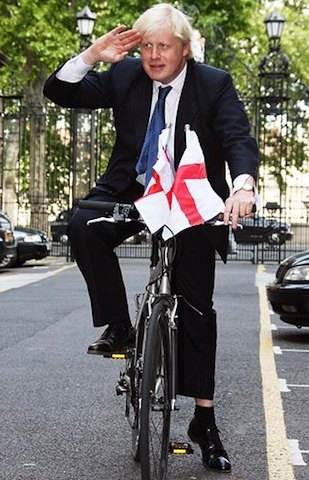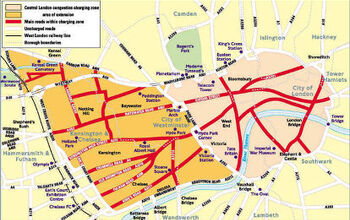UK: London Mayor Backtracks on Congestion Tax
London, England Mayor Boris Johnson is retreating from his campaign pledge to end the city’s “punishment of motorists.” Johnson’s predecessor, Ken Livingstone, lost his re-election in large measure because Johnson pledged to scale back the £8 (US $13) fee imposed on motorists entering the downtown area. Johnson announced Friday that he will boost the tax to £10 (US $16.40) to shore up Transport for London’s mass transit budget. “The proposed increase in the charge will ensure that the system remains effective in controlling traffic levels in central London, and the revenue will also help us fund the vital improvements to London’s transport network that all Londoners want to see,” Johnson said in a statement.
Transport for London data show that the congestion charge has failed in its stated goal of controlling traffic levels downtown. Documented journey times inside the charging zone in 2007 were the same as in 2002, before the tax was collected, according to a 2008 report. Another, independent study found no reduction in pollution within zone. After accounting for £131 million (US $215 million) in overhead, however, the complicated system did provide transit officials with £137 million (US $225 million) in revenue, which came primarily from late payment penalty tickets.
Johnson’s latest proposal introduces a transponder-based automated credit card payment system designed to significantly reduce the number of penalty tickets issued. Drivers who chose to use the radio frequency tracking device will also save £1 on the tax.
Last month, Johnson reacted strongly to criticism that he has been dragging his feet on his promise to eliminate the congestion charge’s western extension. One of Livingstone’s last moves as mayor was to add the boroughs of Kensington, Chelsea and Westminster to the zone in which drivers must pay the £8 fee. Johnson surveyed residents last year of the 28,000 that responded, only 19 percent indicated support for preserving the extension unchanged. Nonetheless, little action has been taken to drop the extension.
“You may have heard the scurrilous rumor that I have reneged on my promise to remove the western extension of the congestion charge,” Johnson wrote on his website. “We have to jump through a number of tedious bureaucratic hoops before the axe can fall, but fall it will. The extended zone will be no more. It will be an ex-zone, the area formerly known as. It will be a dead zone!”
[courtesy thenewspaper.com]
More by The Newspaper
Latest Car Reviews
Read moreLatest Product Reviews
Read moreRecent Comments
- Dave M. Always thought these were a great design, timeless in fact. But as a former Volvo owner who was bled to death by constant repairs starting around 40k miles, run far far away
- MrIcky no
- Keith_93 I've rented both in the past few months. The RAV4 was OK, but the CX5 is wayyyy more civilized. Mazda really impressed me, impressive car on the highway. Simply a well thought out and pleasant drive.
- AZFelix "I must not fear. Fear is the mind killer..."I will adorn the many surfaces of my car with 'do not enter' and 'stop' signs."Where the fear has gone there will be nothing. Only I will remain."
- Ajla Ajla, the head of the "ajla is cool" awareness organization, believes that ajla is cool.


































Comments
Join the conversation
This is why I’ll generally vote for someone who says “Yes, we’re probably going to have to raise taxes and/or cut services. It will suck, but we have to.” rather than “I’ll make everything better and send you a big cheque in the mail”. So you don't vote very often then? :-)